


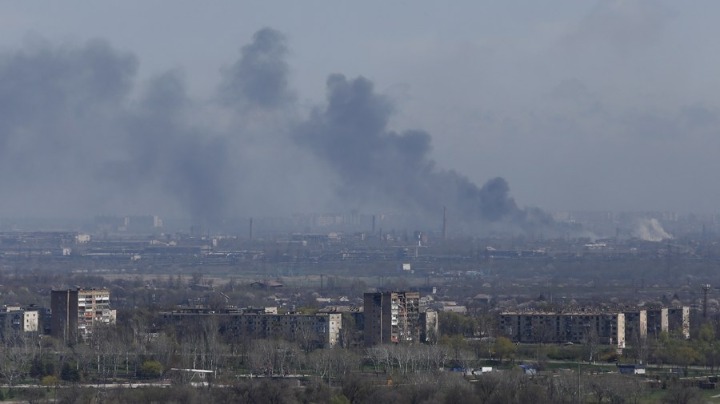
Russia's President Vladimir Putin says his country will continue its yearlong "special military operation" in Ukraine, and he accused the US-led NATO alliance of fanning the flames.
Russia-Ukraine conflict would have cost world economy $1.6 trillion in 2022, according to a study published by the German Economic Institute.
KYIV - Ukrainian President Volodymyr Zelensky on Tuesday visited the frontline city of Bakhmut in Ukraine's eastern Donetsk region, the presidential press service reported.
During his working visit, Zelensky met with personnel of a mechanized brigade involved in the confrontation with Russian forces on the approaches to the city.
Zelensky listened to the commander's report on the operational situation on the frontline and thanked the Ukrainian military for their courage, resilience and strength demonstrated during the fighting.
The Ukrainian president also awarded troops from the mechanized, motorized infantry, mountain assault, tank, artillery and airmobile units with state awards.
In recent weeks, Bakhmut has been the epicenter of the fighting between Ukrainian and Russian troops.
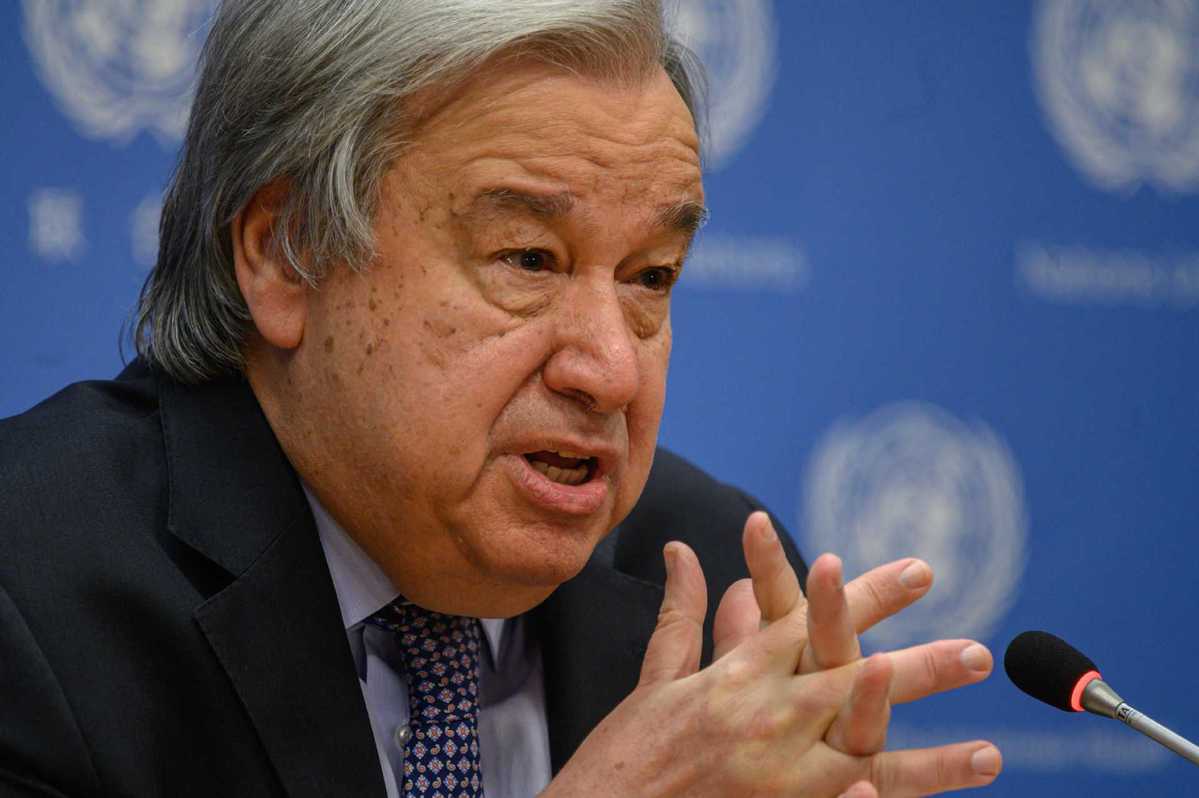
UNITED NATIONS - UN Secretary-General Antonio Guterres said Monday that he did not expect effective peace talks over the conflict in Ukraine "at the immediate future".
"I am not optimistic about the possibility of effective peace talks at the immediate future. I do believe that the military confrontation will go on, and I think we'll have still to wait (for) a moment in which serious negotiations for peace will be possible. I don't see them on the immediate horizon," he said.
And that is why the United Nations is concentrating its efforts on other aspects, such as the increased efficiency and expansion of the Black Sea Grain Initiative, which allows the export of Ukrainian grain and other agricultural products from Black Sea ports, Guterres told an end-of-year press conference at the UN Headquarters in New York.
"We are very interested in accelerating the exchange of prisoners of war and especially when we are approaching Christmas -- and both sides (of the conflict) celebrate Christmas in January. I think this would be something very important," he said. "So, we'll go on trying to be useful, offering platforms of dialogue for these aspects to minimize suffering. But we have no illusions that a true peace negotiation would be possible in the immediate future."
Guterres warned against further escalation of the conflict in Ukraine.
Commenting on reports of possible new Russian offensives in Ukraine, he said there is enough talk about escalation. "We have seen a massive escalation already with the heavy bombardment of electrical infrastructure, which, of course, is having a dramatic impact on the living conditions of the Ukrainians at the present moment ... So, we don't need more to talk about escalation."
"My position is very clear. There is never a military solution for these problems. But it is important that a solution is in line with the UN Charter and with international law," said the UN chief.
He expressed the hope that something positive may happen in 2023.
"When I said I do not see chances for a true peace negotiation on the immediate horizon, I did not mean the whole of 2023. I strongly hope that, in 2023, we'll be able to reach peace in Ukraine," he said.
The consequences for the Ukrainian people, for the Russian society and the economy, and for the global economy, especially for developing countries, are reasons for the world to do everything possible to make a peace solution happen before the end of 2023, said Guterres.

Pentagon officials are close to finalizing a plan to send a Patriot air defense missile system to Ukraine amid the ongoing conflict between Kyiv and Moscow, US officials said on Tuesday.
The United States is "poised" to provide at least one Patriot missile battery to Ukraine once the plan is approved, one of the officials said. The approval is likely to come later this week, said three officials, who spoke on condition of anonymity because the decision is not final and has not been made public.
The Pentagon's plan still needs to be approved by Defense Secretary Lloyd Austin before it is sent to US President Joe Biden for his signature.
The Patriot system is highly mobile, and uses ground-based radar to locate and track aerial threats that can then be shot down with a surface-to-air missile. Initially designed to take out aircraft, upgrades over the years have made the system effective at intercepting ballistic and cruise missiles.
Ukraine has been calling for the US to send the advanced long-range air defense system that is highly effective at intercepting ballistic and cruise missiles.
The Pentagon declined to comment on reports about the Patriot system at a news briefing.
Dmitry Medvedev, deputy chairman of the Russian Security Council, has warned NATO against providing Ukraine with Patriot missile defenses, and it is likely Moscow will view the move as an escalation.
In Kyiv, Ukrainian authorities reported explosions in the capital on Wednesday, saying two administrative buildings were hit in a downtown district that is home to many government buildings. It was not immediately clear whether there were any casualties.
In Paris, Ukraine's Western allies pledged an additional 1 billion euros ($1.1 billion) in emergency winter aid on Tuesday, responding to pleas from Ukrainian President Volodymyr Zelensky.
Around 70 countries and international organizations gathered in Paris for a meeting aimed at enabling Ukrainians "to get through this winter", French President Emmanuel Macron said.
In Brussels, the European Union energy ministers' meeting on Tuesday failed to strike a final deal on a blocwide cap on natural gas prices, after months of debate among member countries over whether the measure can ease Europe's energy crisis.
Agencies contributed to this story.
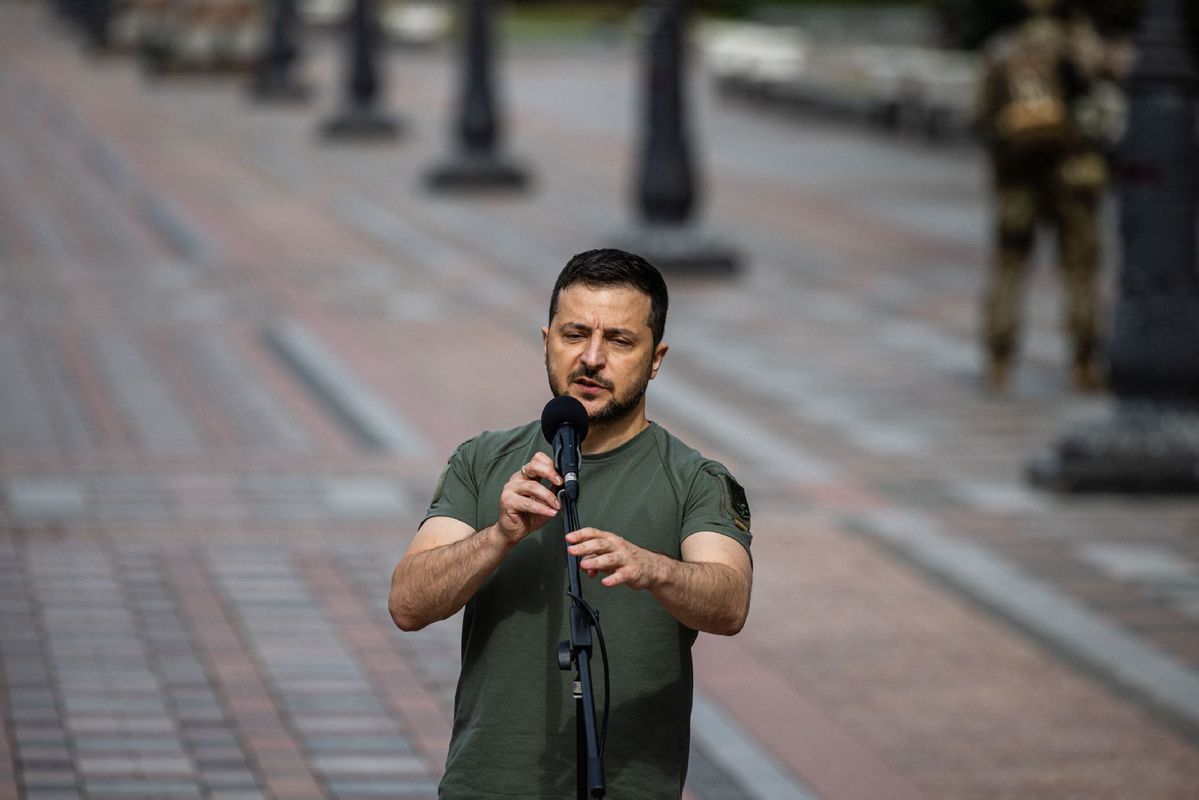
KYIV - Ukrainian President Volodymyr Zelensky said on Sunday that he had separate conversations with French President Emmanuel Macron and Turkish President Recep Tayyip Erdogan.
Zelensky tweeted that he discussed with Macron "the implementation of our ten-step peace formula, cooperation on defense and energy stability" of Ukraine.
In the conversation with Erdogan, Zelensky thanked Türkiye for "sheltering Ukrainian children and providing hundreds of generators for our cities."
Zelensky and Erdogan also discussed the "Grain from Ukraine" program and the possible expansion of the Black Sea Grain export deal.
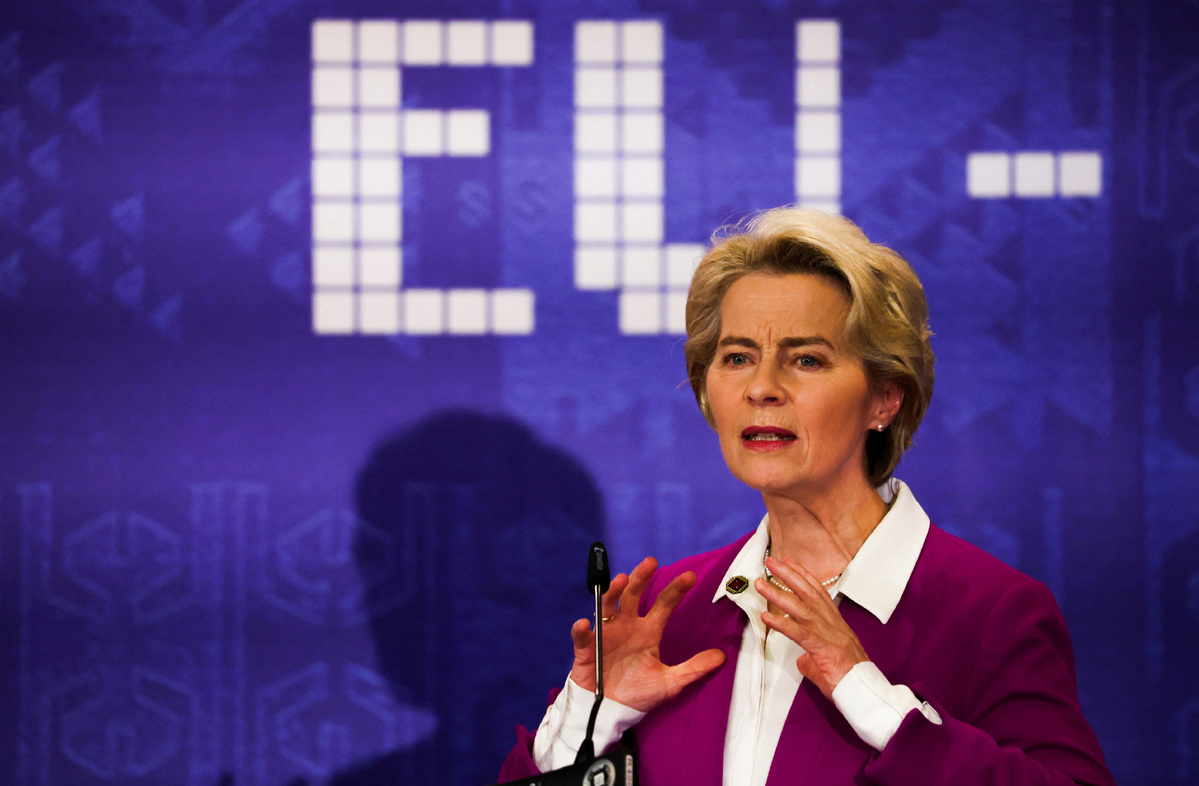
BRUSSELS - The European Commission on Wednesday proposed the ninth package of sanctions against Russia that will include almost 200 individuals and entities and cut Russia's access to drones.
European Commission President Ursula von der Leyen said in a statement that the eight packages of sanctions introduced so far were "biting hard" but the Commission was "stepping up the pressure on Russia."
The ninth package proposes adding almost 200 additional individuals and entities to the sanctions list, including the Russian armed forces, as well as individual officers and defense industrial companies, among others.
It also proposed sanctions against three additional Russian banks, including a full transaction ban on the Russian Regional Development Bank.
Moreover, the European Commission proposed the imposition of new export controls and restrictions on key chemicals, nerve agents, electronics and IT components that could be used by Russia.
Von der Leyen said European Union will cut Russia's access to drones and unmanned aerial vehicles, proposing to ban the direct exports of drone engines to Russia and the export to any third countries, such as Iran, which could supply drones to Russia.
The European Union will also take four additional Russian channels off the air and all other distribution platforms.
Von der Leyen said the Commission was also proposing further economic measures against the Russian energy and mining sector, including a ban on new mining investments in Russia.
So far more than 1,200 individuals and 118 entities connected to Russia have been sanctioned, including Russian President Vladimir Putin and his inner circle.
The proposal is subject to the approval of the Council of the EU and the European Parliament.

KYIV -- Ukrainian Foreign Minister Dmytro Kuleba on Tuesday warned Iran of the "consequences" of the arms supplies to Russia, the Ukrainian government-run Ukrinform news agency reported.
"Our signal to them (the Iranian side) was very clear: first, either you stop or you will face a set of the most severe consequences. Second, no matter what benefits you have from cooperation with Russia in the supply of drones or other weapons, the negative consequences for you will outweigh any benefits," Kuleba said at an online briefing.
Ukraine is closely following Iran's "every step" in the matter of military-technical cooperation with Russia, the minister said.
In October, the Ukrainian Foreign Ministry accused Iran of sending combat drones to Russia for use in the Russia-Ukraine conflict.
Last month, Iranian Foreign Minister Hossein Amir-Abdollahian said that Iran had given "a limited number" of drones to Russia months before the start of the Russia-Ukraine conflict, according to Iran's official news agency IRNA.

KYIV -- Ukraine received $1.5 billion in grant aid from the United States mobilized by the World Bank, the Ukrainian Finance Ministry said Friday on Facebook.
The funding is the first tranche of the additional grant financing worth $4.5 billion provided by the US government to Ukraine under the World Bank's Public Expenditures for Administrative Capacity Endurance in Ukraine project, the ministry said.
The financing will be used for paying pensions for the elderly, social assistance, covering expenditures on medical services, and other payments, it said.
The World Bank has mobilized close to $17.8 billion in emergency financing to support Ukraine amid the economic impacts of the Russia-Ukraine conflict, according to the bank's website.
Out of this sum, 11.4 billion of financing has been disbursed.
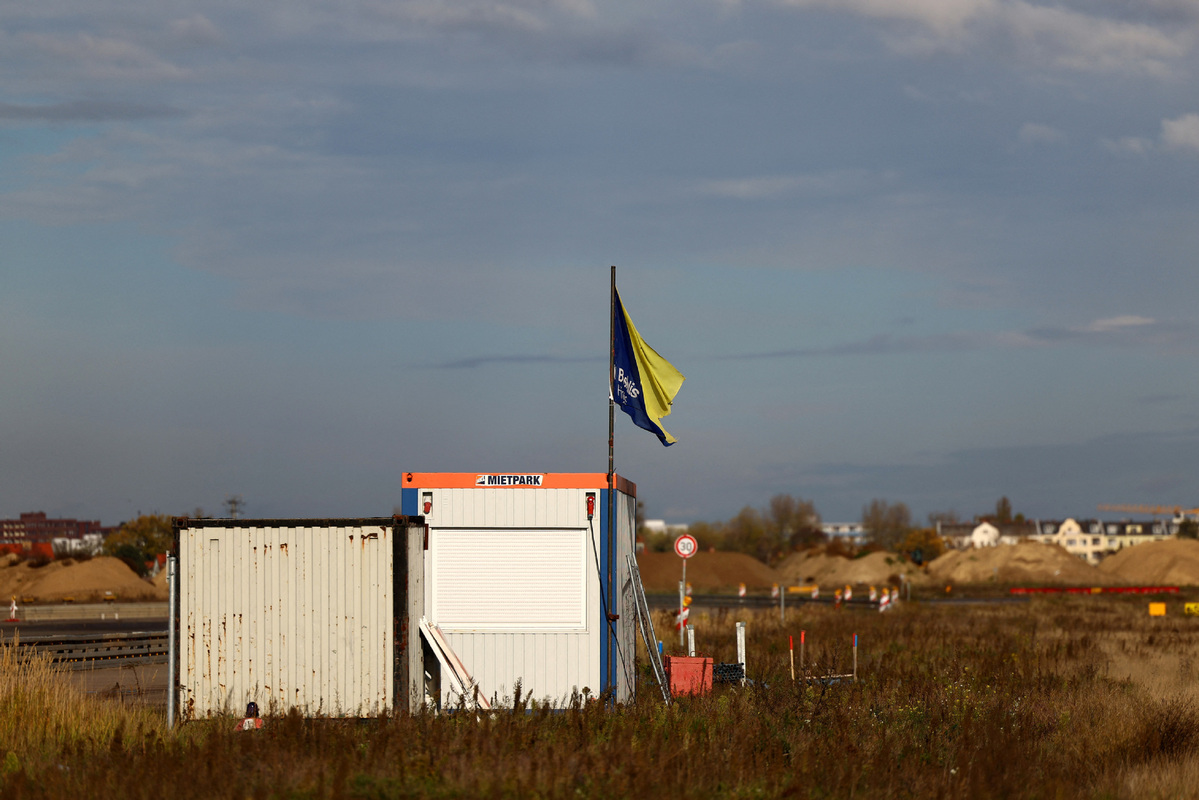
Nation's services and infrastructure is struggling with 1 million new arrivals
More than 1 million Ukrainians have moved to Germany since the start of the Russia-Ukraine conflict, highlighting the welcoming attitude of the nation of 83 million, but placing a strain on services and infrastructure.
The influx has reportedly led to a dearth of suitable accommodation, and the creation of temporary solutions, such as the conversion of gyms and village halls into dormitories, and the setting-up of temporary tent cities, including one on a former airfield on the outskirts of Berlin that houses 1,000 people.
Kleo Tummler, the facility's operations manager, told the BBC: "We are built to take care of people for a few days. Sometimes, they have to stay here for two weeks, maybe three weeks."
She said the fact that people are finding it increasingly difficult to move on, to long-term accommodation, has led volunteers to find solutions, such as plumbing-in washing machines, and starting lessons for the 300 children who live there.
Some Germans have reportedly started to balk at the prospect of seeing community facilities, such as sports arenas and convention centers, converted into temporary accommodation for Ukrainian refugees.
Martina Schweinsburg, a district councilor in the German state of Thuringia, said: "Our capacities are exhausted. Our backs are against the wall."
She is not alone. In a recent survey, ARD, Germany's national broadcaster, found that concerns about immigration had increased during the previous year, with 53 percent of Germans now saying too many people had made their way to the country, which was 11 percent higher than a year earlier.
That sense among some people that Germany is full, not only to refugees from Ukraine but to those from Syria, Iraq, Afghanistan has prompted several recent attacks on refugee-handling facilities, including the burning of a building in the capital that processed Ukrainians.
The situation led Interior Minister Nancy Faeser to describe things as "tense", and say the German government had acknowledged the influx of Ukrainian refugees had been difficult on communities and that it would do more to help.
"While the government already allocated federal real estate for tens of thousands of refugees earlier this year, it will immediately provide additional property for about 4,000 refugees, to ease the current housing crisis," she said.
Faeser said there will also be new money, but an exact figure has not yet been announced.
Agence France-Presse news agency noted that, out of all European Union nations, only Poland, which shares a long border with Ukraine, has taken in more Ukrainian refugees. The Associated Press news agency also said Germany continues to be one of the most welcoming nations anywhere in the world, despite the challenges it is facing.
KYIV/MOSCOW - More than 4,000 emergency shelters called "Points of Invincibility" have been set up in Ukraine amid blackouts after Russia's recent missile attacks on energy infrastructure, said Ukrainian Prime Minister Denys Shmyhal.
The "Points of Invincibility" provide people with heat, water, lighting, mobile communication, Internet, power for mobile devices, places for rest, first aid kits, and basic supplies for mothers and children. Each emergency shelter can accommodate 40 to 500 people without a limit on the time of stay.
In Kyiv alone, a total of 430 emergency shelters have been set up, according to its mayor, Vitaly Klitschko.
Kyiv - After the latest prisoner swap with Russia, 50 Ukrainian servicemen have returned home, head of the Ukrainian President's Office Andriy Yermak said Thursday.
Among those released were two officers, as well as 48 sergeants and soldiers, Yermak wrote on Telegram.
Most of the released soldiers served in Ukraine's Naval Forces, the National Guard, and the Armed Forces, he added.
Yermak did not provide the details on the number of Russian troops released by Ukraine under the deal.
The efforts to free more Ukrainian servicemen from Russian captivity are underway, the official said.
Ukraine and Russia conducted their first prisoner exchange in March.
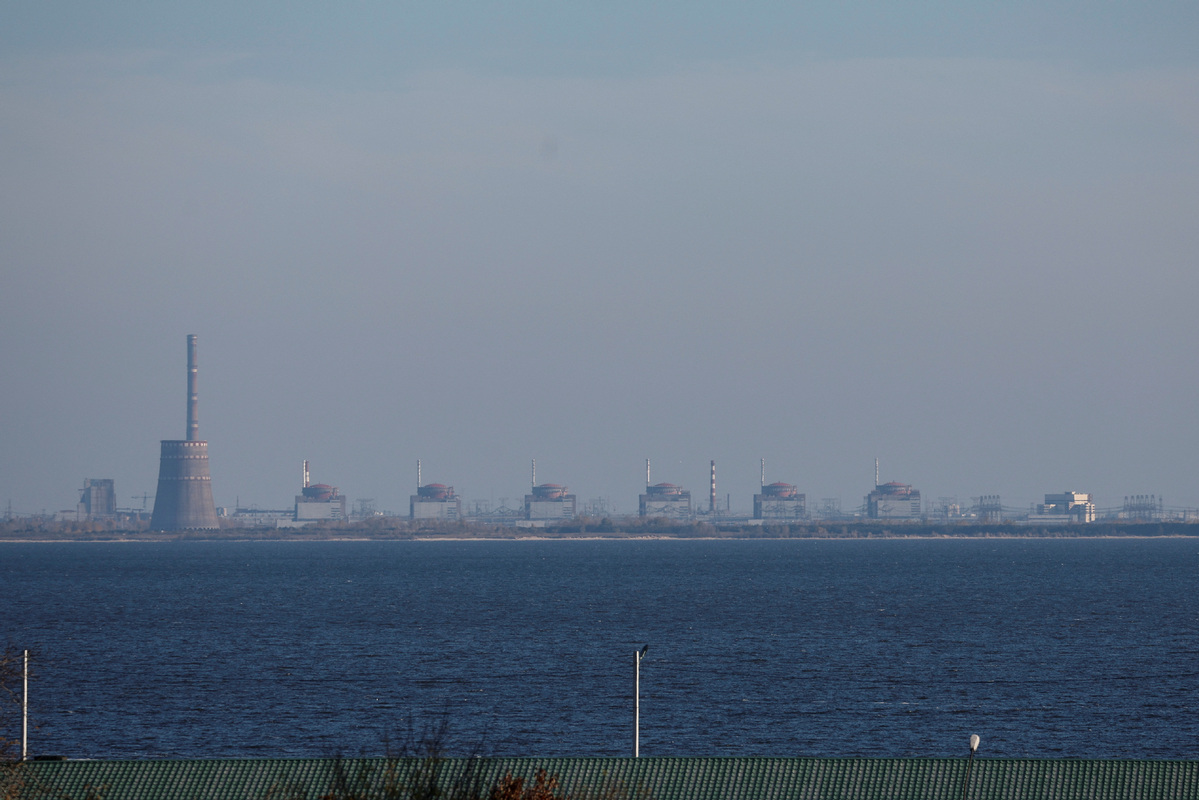
VIENNA - The International Atomic Energy Agency (IAEA) said on Monday that there were "no immediate nuclear safety or security concerns" at the Zaporizhzhia nuclear power plant in Ukraine despite intense shelling at the facility over the weekend.
The United Nations nuclear watchdog said in a statement that its experts at the Zaporizhzhia plant assessed the damage at the site earlier that day and found its "key equipment remained intact".
"The status of the six reactor units is stable, and the integrity of the spent fuel, the fresh fuel and the low, medium and high-level radioactive waste in their respective storage facilities was confirmed," the IAEA statement quoted its expert team as saying.
However, the IAEA said its experts "still observed widespread damage across the site" due to the shelling on Saturday evening and Sunday morning, described by the agency as "one of the most serious such incidents at the facility in recent months".
The experts' observations included damage to the plant's condensate storage tanks and several impacts on the main road along the plant's reactors, according to the statement.
Repair work for the damage is underway, the agency said, adding that there had been no further attacks on the plant on Monday.
The IAEA also said that its Director General Rafael Grossi had intensified consultations to establish a protection zone at the Zaporizhzhia plant following the latest attacks on the facility.
The Zaporizhzhia nuclear power plant, one of the largest nuclear power plants in Europe, has been under the control of Russian forces since March.
In recent months, the plant has been attacked by shelling, with Russia and Ukraine accusing each other of the attacks.
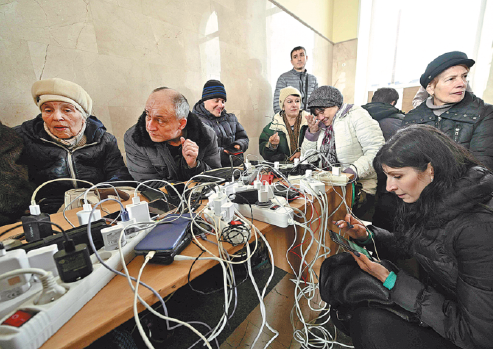
GENEVA — More remains to be done for the reintegration of Russian and Ukrainian food and fertilizers into global markets, particularly in light of the fertilizer crunch caused by insufficient volumes and high costs, a senior United Nations official has said.
Rebeca Grynspan, secretary-general of the UN Conference on Trade and Development, said on Friday that while food and fertilizers produced in Russia are exempt from the sanctions, the knock-on effects of the sanctions and their differing interpretations tend to cause bottlenecks in the trade and export of such products.
About 300,000 tons of Russian fertilizer are stranded in European ports, she said. And it had been determined that services associated with the export of food and fertilizers from Russia, such as insurance, are exempt from sanctions. A platform will be set up so that insurance companies will no longer have to conduct their due diligence on a case-by-case basis, she said.
On July 22, Russia and Ukraine separately signed the Black Sea Grain Initiative in Istanbul with Turkiye and the UN on grain and fertilizer exports from Ukraine and Russia to ensure supplies to global markets amid the Russia-Ukraine conflict.
The initial duration of the deal was 120 days, meaning it was to expire on Saturday. Russia and Ukraine agreed on Thursday to prolong the deal on the export of grain and fertilizers from Black Sea ports for a further 120 days.
There had been some progress on a few important questions concerning the issue, Grynspan said, adding that it was vital to scale up the initiative, and the UN is striving to create the necessary conditions by bringing together the private sector, including traders and shipping companies, and regulators to identify the practical difficulties stemming from the sanctions.
Ukraine's grain exports may reach 40.3 million tons in the 2022-23 marketing year if the grain corridor continues functioning, the government-run Ukrinform news agency reported on Friday, citing a recent forecast by the analytical agency APK-Inform in Kyiv.
Under an optimistic scenario, Ukraine could sell 24 million tons of corn, 13.8 million tons of wheat and 2.4 million tons of barley overseas in the current season, APK-Inform said.
Britain's Prime Minister Rishi Sunak made a surprise visit to Ukraine on Saturday and used his first visit to Kyiv to announce a major new air defense spending the equivalent of $60 million.
This comprises "125 anti-aircraft guns and technology to counter deadly Iranian-supplied drones, including dozens of radars and anti-drone electronic warfare capability", Downing Street said.
It follows more than 1,000 new air-defense missiles announced by British Defence Secretary Ben Wallace earlier last week.
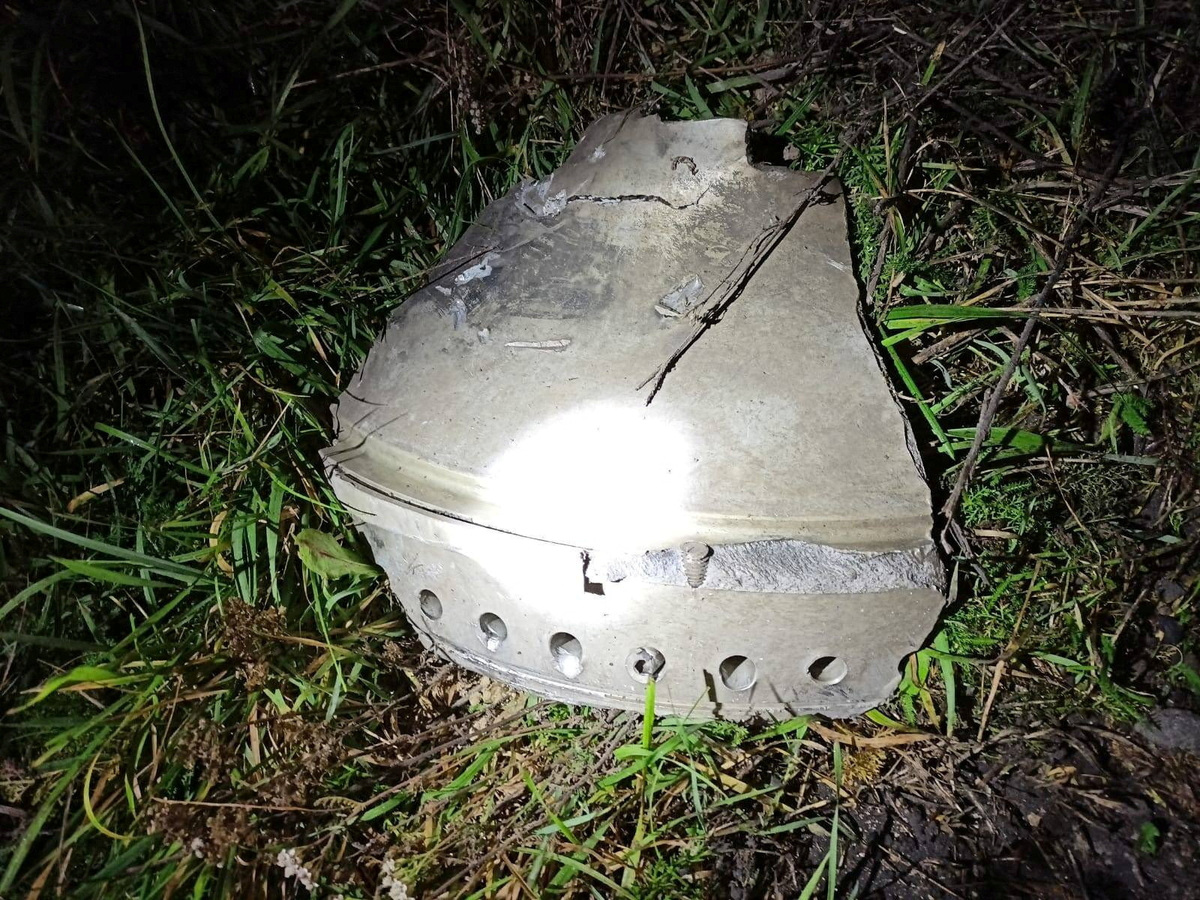
MOSCOW/KYIV - Russian experts have confirmed from pictures of the wreckage of the projectile falling in Poland that it was a Ukrainian missile, the Russian Defense Ministry said on Wednesday.
The rocket was an anti-aircraft guided missile of the S-300 air defense system of the Ukrainian air forces, the ministry said in a statement.

Russia is open to dialogue on Ukraine without preconditions, Russian Deputy Foreign Minister Sergei Ryabkov told reporters on Friday.
Also on Friday, Kremlin spokesman Dmitry Peskov said that Kherson region remains part of the Russian Federation as "its status is legislatively fixed. There are no and cannot be any changes."
Peskov said that it is possible to achieve the goals of the special military operation in Ukraine through peaceful negotiations, but now talks are impossible because of the Kyiv's position.
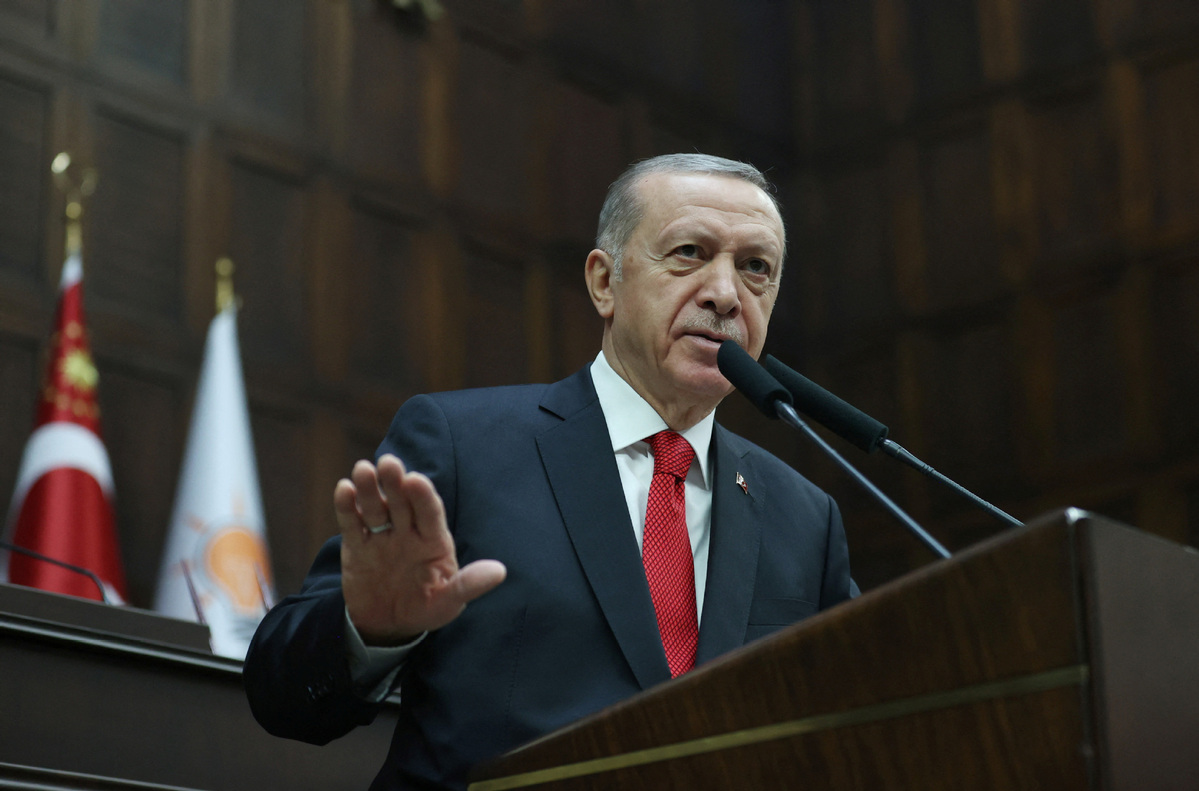
ANKARA - Turkiye is trying to open a peace dialogue between Russia and Ukraine although the West, particularly the United States, provokes Moscow, Turkish President Recep Tayyip Erdogan said on Saturday.
"The West, especially the US, is attacking Russia almost without limits. Against all this, of course, Russia is putting up resistance," the semi-official Anadolu Agency quoted Erdogan as saying.
Ankara has been working on the establishment of "a peace corridor" in the same way that it had made it possible for the grain corridor from Ukraine to resume, Erdogan told reporters onboard a flight from Uzbekistan to Turkiye.
"We think the best way to achieve peace is through a path of dialogue. But for now, the most important thing for us is to operate the grain corridor seriously," Erdogan said. The Turkish president said it would be wrong to put a time limit on the Black Sea Grain Initiative, which allows the export of Ukrainian grain and other agricultural products from Black Sea ports.
"We told Russia and Ukraine that the longer they keep this deal, the more accurate it will be," he said. Brokered by the United Nations and Turkiye, the Black Sea Grain initiative was reached in late July to establish a maritime humanitarian corridor in the Black Sea for grain and agricultural products exports amid the Russia-Ukraine conflict.
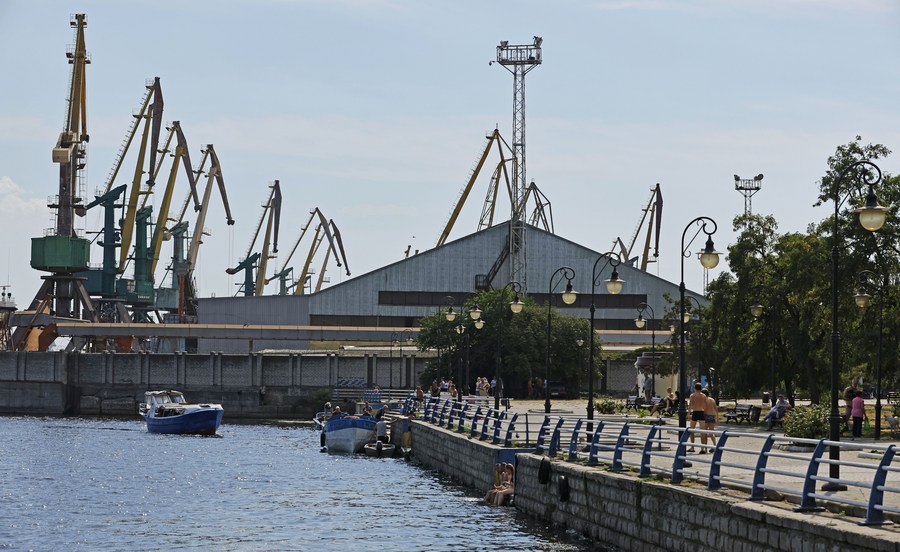
MOSCOW/KIEV -- Ukraine has taken control of the southern city of Kherson after Russia transferred all its armed forces to the left (eastern) bank of the Dnieper River on Friday.
"In the Kherson direction today at 5 am Moscow time (0200 GMT), the transfer of units of Russian troops to the left bank of the Dnieper River was completed. Not a single piece of military equipment and weapons were left on the right bank," Russian Defense Ministry spokesman Igor Konashenkov told a briefing.
There were no losses of personnel, weapons, military equipment and materials during the process, he said.
Konashenkov stressed that all Russian servicemen had crossed the river to the left bank and civilians who wanted to leave the right-bank part of the Kherson region had received assistance.
The Russian armed forces have established defensive lines in the left bank of the wide river, he said.
Later in the day, Konashenkov told reporters that over 30,000 Russian servicemen and nearly 5,000 pieces of equipment had been pulled back to the left bank.
Following the retreat of Russian troops, the Ukrainian armed forces entered Kherson city, located on the right (western) bank of the Dnieper River, the Main Intelligence Directorate of Ukraine's Defense Ministry said on Friday.
"Kherson is returning under the control of Ukraine," it said in a statement on Telegram, urging Russian soldiers who failed to leave to surrender.
Russian Defense Minister Sergei Shoigu on Wednesday ordered Russian troops in Ukraine to leave the right bank of the Dnieper River and strengthen the defense against Ukrainian offensives on the left bank.
While reporting to Shoigu, Sergei Surovikin, commander of Russia's joint group of forces in Ukraine, called it a difficult decision to withdraw but it would most importantly preserve the lives and combat capability of the Russian forces.
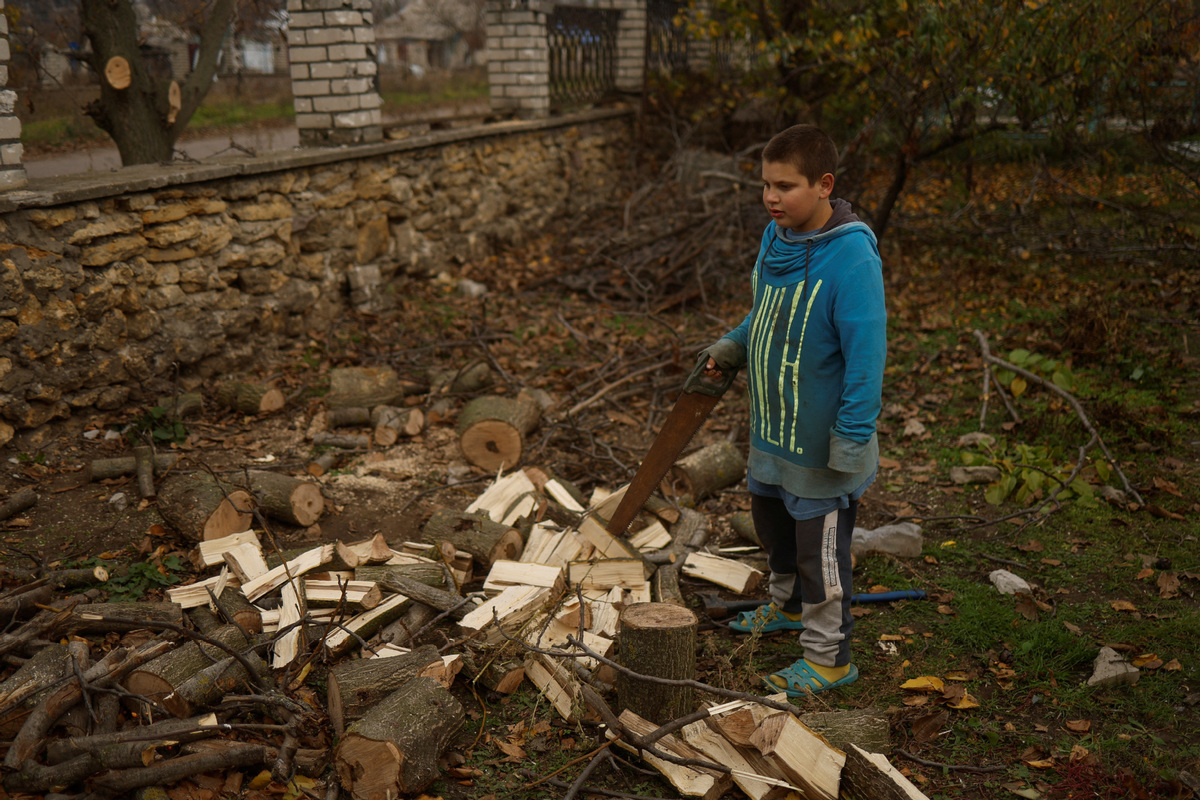
Russia announced on Wednesday that it was withdrawing its forces to the eastern side of the Dnieper River in the Kherson region.
The strategically important city of Kherson was the first regional capital in southern Ukraine to be captured by Russian forces after the special military operation began in February.
The order for the retreat came from Russian Defense Minister Sergey Shoigu in a meeting with top military leaders that was broadcast on Russian state television. General Sergey Surovikin, Russia's top commander in Ukraine, had explained that heavy shelling by advancing Ukrainian forces had posed serious threats to the Russian position west of the Dnieper River, where Kherson is.
Defense along the Dnieper barrier frontier is the most expedient option for operations in the zone covered by the special military operation, Surovikin said.
"The decision to defend on the left bank of the Dnieper is not easy, but at the same time we will save the lives of our military personnel and the combat capability of our forces," Surovikin said in a clip aired on state television.
He told Shoigu that the withdrawal of the forces will free up troops for deployment to other active operations.
The withdrawal of about 20,000 troops will enable Russia to consolidate its defensive lines, said Surovikin, adding that the broad river can serve to defend positions.
"Go ahead with the pullout of troops and take all measures to ensure the safe transfer of troops, weapons and equipment to the other bank of the Dnieper River," Shoigu said.
According to The New York Times, Ukrainian officials said there was strong evidence that Russians were withdrawing from the territory they held west of the river, as Ukrainian soldiers entered some front-line villages that had been under Russian control in the morning.
"We have signs they are pulling out", moving heavy equipment first and then infantry, said Roman Kostenko, a Ukrainian army colonel and chairman of the defense and intelligence committee in Parliament.
Advancing Ukrainian forces captured the settlement of Kalininskoye and the city of Snihurivka, northeast of Kherson city, early on Wednesday, further applying pressure on Russian forces around the regional capital.
Also on Wednesday, Alexander Shevchenko, a member of the Russian delegation to the United Nations General Assembly, said Russia is ready to ensure access to nuclear facilities in Sevastopol as part of the implementation of the guarantees to the International Atomic Energy Agency.
The IAEA guarantees are a package of measures used by the agency to make sure that nuclear facilities are used properly and nuclear material is used for peaceful purposes.
"Russia is ready to give access to these facilities upon a corresponding request. These facilities have nothing to do with the implementation of guarantees in Ukraine," he said at a UN General Assembly session dedicated to the IAEA report for 2022.
Separately, Russian President Vladimir Putin will not attend a gathering of leaders from the Group of 20 nations on the resort island of Bali next week, Reuters quoted Indonesian and Russian officials as saying on Thursday.
Putin will instead be represented by Russian Foreign Minister Sergey Lavrov, the officials said.
The Russian president might take part by video conference, though "the format of (his) participation is being worked out," Russia's state news agency RIA Novosti reported, citing a diplomat in the Russian embassy in Indonesia.
Agencies contributed to this story.
renqi@chinadaily.com.cn
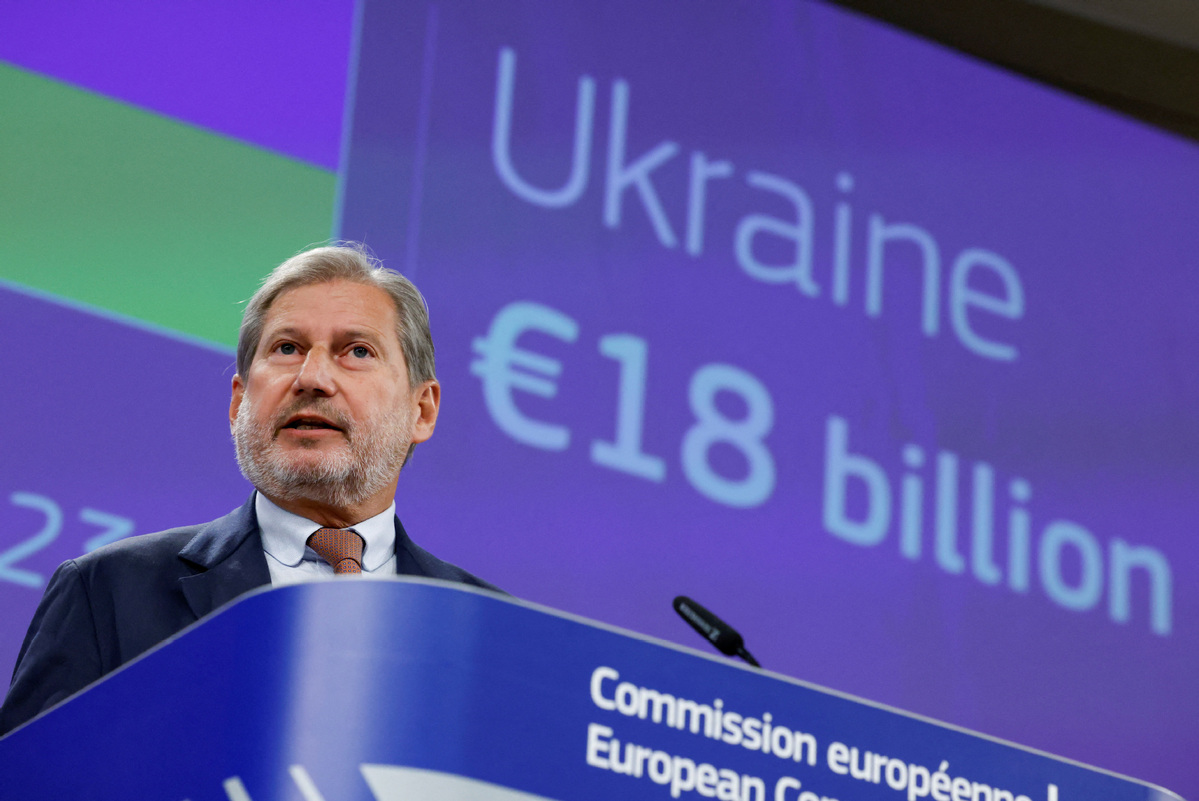
The European Commission on Wednesday proposed an 18 billion euro ($18 billion) financial assistance package to Ukraine next year to meet its budgetary needs, after failing to secure the pledged amount this year.
The commission said the concessional loans, averaging 1.5 billion euros a month, will help cover part of Ukraine's short-term funding needs next year. The International Monetary Fund and the Ukrainian government had estimated funding needs to be at 3 to 4 billion euros a month.
It said the money will help Ukraine pay wages and pensions and keep essential public services running, as well as ensure macroeconomic stability and restore critical infrastructure.
The IMF also estimated that the Ukrainian economy will shrink by 35 percent in real terms this year. Inflation is set to hit 30 percent.
The commission is putting forward legislative proposals to be approved by the European Parliament and the 27 member states to ensure the delivery of the funding.
European Union leaders are scheduled to meet for their regular summit on Dec 15 and 16 in Brussels to discuss a wide range of issues, including their support for Ukraine.
"And it needs to be decided quickly — 2023 is approaching fast and Ukraine's financing needs are urgent," European Commission Executive Vice-President Valdis Dombrovskis said.
"So we will be working to secure approval from the European Parliament and Council before the end of the year and we are aiming for the first disbursement in January."
The commission said the assistance will be accompanied by reforms in Ukraine to improve the rule of law, good governance, anti-fraud and anti-corruption measures to pave the way for Ukraine to join the EU.
EU member states agreed to grant Ukraine candidate status in June. But the process to become a formal member is likely to take at least years or even decades.
The proposed loans will be borrowed by the EU on capital markets. They will be repaid by Ukraine in 35 years starting from 2033, with interest rate costs to be covered by the EU.
Some EU member states have voiced their reservations about the EU taking on responsibility for Ukraine's growing debt.
Hungarian Foreign Minister Peter Szijjarto said early this week that although Budapest intends to continue providing financial support on a bilateral basis, it opposes allowing the EU to take out credit to help Ukraine.
Bloomberg News, quoting informed sources, reported on Wednesday that Hungary told EU finance ministers at a meeting in Brussels that it will not support the current proposal for the 18 billion euro package.
The EU has delivered 4.2 billion euros in macro-financial assistance to Ukraine so far this year, and plans to provide another 2.5 billion euros by the end of this month. However, there is still a gap in how the EU could honor the entire 9 billion euros to Ukraine as announced by the European Commission in May.
Ukrainian President Volodymyr Zelensky expressed his appreciation for the new proposal. "This shows true solidarity of the EU," he said in a tweet on Wednesday.
The United States has also pledged to deliver $1.5 billion a month in financial assistance to Ukraine. But Kevin McCarthy, minority leader of the House of Representatives, expressed recently that US assistance to Ukraine will not be a "blank check".
chenweihua@chinadaily.com.cn

UNITED NATIONS - The world body continues to conduct consultations in an effort to have the Black Sea Grain Initiative renewed, said a UN spokeswoman on Wednesday.
"We continue to urge parties to continue exerting full and good faith in the implementation of the initiative and to facilitate the timely, safe and unimpeded movement of vessels," said Stephanie Tremblay, an associate spokeswoman for UN Secretary-General Antonio Guterres. "As we mentioned before, this is a critical supply line, and it needs to continue delivering more and much-needed food to the world."
The head of the UN Conference on Trade and Development, Rebeca Grynspan, and UN Undersecretary-General for Humanitarian Affairs Martin Griffiths will be meeting with a high-level delegation from Russia on Friday in Geneva, she said. "So, this is a new development on the negotiations."
The initial duration of the Black Sea Grain Initiative, which allows the export of Ukrainian grain and other agricultural products from Black Sea ports, is 120 days and expires on Nov 19. The parties had agreed that the deal could be extended automatically on the condition that no party objects.
Russia on Oct 29 announced the suspension of its participation in the deal brokered by the United Nations and Türkiye following an attack on the Russian Black Sea Fleet. Moscow agreed to resume its participation days later following intense diplomatic engagement.
Along with the Black Sea Grain Initiative, there was a concurrent agreement on the facilitation of the export of Russian food products and fertilizer. Moscow has repeatedly complained about the lack of progress concerning Russian exports.
Asked whether the United Nations has received any information from Russia regarding its intentions on the renewal of the Black Sea Grain Initiative, Tremblay said negotiations are ongoing.
"There's going to be this meeting (in Geneva) in two days. So let's not prejudge what will happen at this meeting," she said.

KYIV - Ukrainian Presidential Advisor Mykhailo Podolyak said that Kyiv could resume dialogue with Moscow only after the withdrawal of Russian troops from Ukraine, the presidential press service reported Tuesday.
In an interview with the Italian newspaper La Repubblica, Podolyak said that a potential ceasefire deal at the current stage of the conflict would provide Russia with time to strengthen its positions.
"The ceasefire for Russia is a tactical pause for reinforcement," Podolyak said.
While commenting on the reports that the representatives of the US Pentagon and the Russian Defense Ministry are involved in talks, Podolyak said that "there are no negotiations between Russia and Western countries regarding Ukraine".
"Our partners adhere to the principle of 'nothing about Ukraine without Ukraine.' Neither side will be able to ensure the implementation of agreements without the support of the Ukrainian people," he said.
The Russia-Ukraine conflict started on Feb 24.
Ukrainian and Russian negotiators held the latest round of face-to-face peace talks in Istanbul, Türkiye, on March 29.
